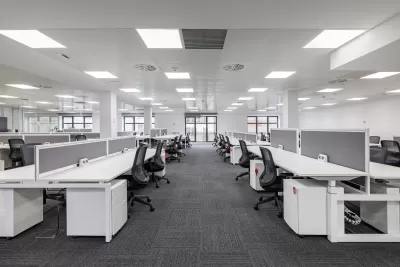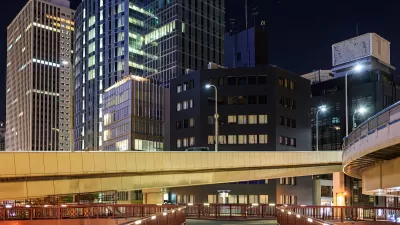To encourage more housing production, lawmakers could help make the costly and time-consuming adaptive reuse process easier and more cost-effective.

During the height of the Covid-19 pandemic, the potential for converting offices, hotels, malls, and other commercial buildings to housing became a hot topic as occupancy rates in office buildings plummeted and, in many cases, have remained low as the pandemic wanes. With office vacancy rates at a 30-year high, developers and housing advocates saw the possibility in adaptive reuse to create a win-win situation amidst a deepening housing crisis.
As Erika Bolstad explains in Next City, the conversion of offices to housing is more complicated and expensive than it seems at first glance, but new legislation at the local, state, and federal levels could make the process easier and less costly.
In Oregon, legislation proposed by Rep. Pam Marsh would “would require the state’s larger cities to allow commercial-to-residential conversions without mandating zoning changes or conditional use permits” and local governments to waive development fees. “In California, state Assemblymember Matt Haney, a Democrat from San Francisco, introduced legislation to bar local officials from delaying or denying commercial-to-residential projects.” Washington, D.C. developers can receive a 20-year tax abatement for commercial-to-housing projects.
Despite the efforts made by states and cities, office conversion remains “a fringe trend at best,” for now, but recent legislative changes could tip the balance in favor of more conversions.
FULL STORY: Converting Offices To Housing Is Hard. These Changes Could Make It Easier.

Study: Maui’s Plan to Convert Vacation Rentals to Long-Term Housing Could Cause Nearly $1 Billion Economic Loss
The plan would reduce visitor accommodation by 25,% resulting in 1,900 jobs lost.

Alabama: Trump Terminates Settlements for Black Communities Harmed By Raw Sewage
Trump deemed the landmark civil rights agreement “illegal DEI and environmental justice policy.”

North Texas Transit Leaders Tout Benefits of TOD for Growing Region
At a summit focused on transit-oriented development, policymakers discussed how North Texas’ expanded light rail system can serve as a tool for economic growth.

How Community Science Connects People, Parks, and Biodiversity
Community science engages people of all backgrounds in documenting local biodiversity, strengthening connections to nature, and contributing to global efforts like the City Nature Challenge to build a more inclusive and resilient future.

Alabama: Trump Terminates Settlements for Black Communities Harmed By Raw Sewage
Trump deemed the landmark civil rights agreement “illegal DEI and environmental justice policy.”

Dear Tesla Driver: “It’s not You, It’s Him.”
Amidst a booming bumper sticker industry, one writer offers solace to those asking, “Does this car make me look fascist?”
Urban Design for Planners 1: Software Tools
This six-course series explores essential urban design concepts using open source software and equips planners with the tools they need to participate fully in the urban design process.
Planning for Universal Design
Learn the tools for implementing Universal Design in planning regulations.
City of Santa Clarita
Ascent Environmental
Institute for Housing and Urban Development Studies (IHS)
City of Grandview
Harvard GSD Executive Education
Toledo-Lucas County Plan Commissions
Salt Lake City
NYU Wagner Graduate School of Public Service




























